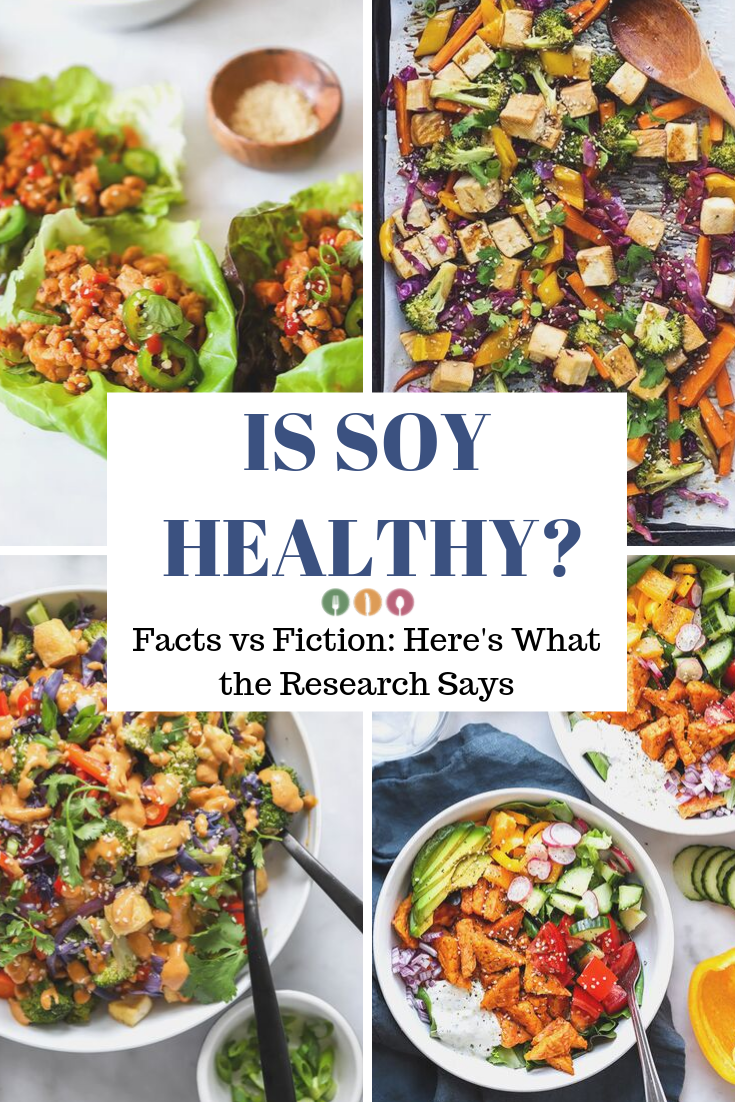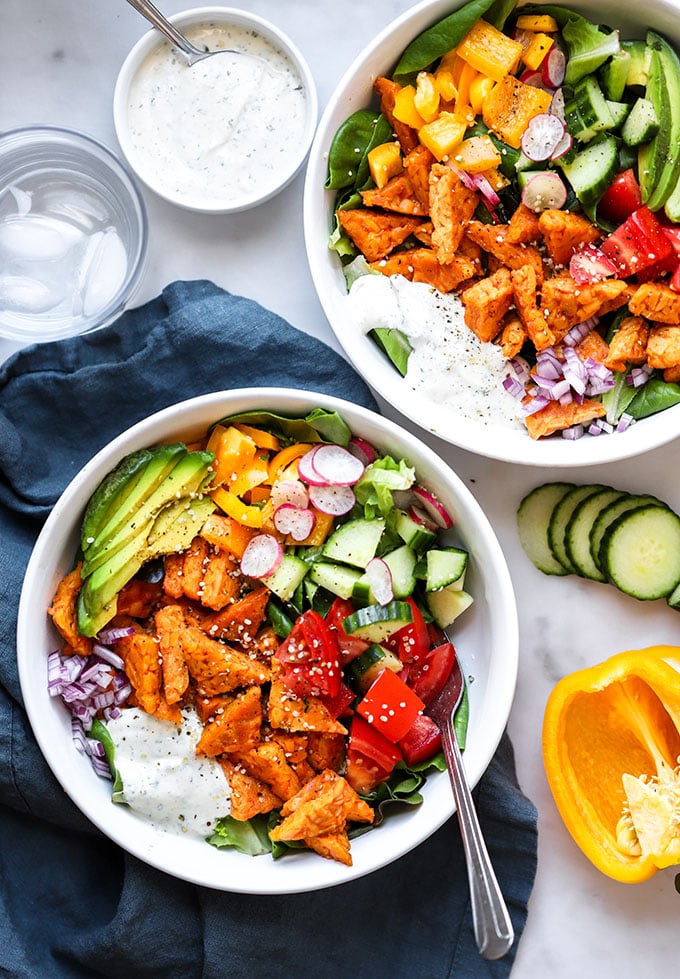Have questions about whether soy foods like tofu and soy milk are good for you? We’ll review all the common concerns most people have about whether they should be eating soy.

Do you include soy in your diet, or are you unsure if it’s good for you? Soy is one of the most well-researched foods, but many people are still conflicted and fearful of soy. If you feel this way, you’re not alone.
In order to clear up the confusion, today I’m going to review the most common myths and truths about soy.
Why is Soy Good for You?
Let’s start by talking about some of the reasons to include soy foods into your diet! Of course, when we talk about the health benefits associated with soy, we are referring to minimally processed soy foods like tempeh, tofu, soy milk, miso, and natto — NOT soy isolates or other heavily processed forms of soy.
- A Complete Protein: Soybeans are a complete protein, which means they provide an adequate amount of all the essential amino acids we need for energy and optimal health. They also have a high protein digestibility score, so they are considered one of the highest-quality protein sources. –> Check out my guide for more information on plant-based protein.
- Rich in Fiber: Some soy foods like edamame and tempeh are a good source of fiber, which is a nutrient most Americans are lacking in their diet.
- Packed with Phytonutrients: Soy foods contain many phytonutrients, plant compounds which may have health benefits such as:
- Isoflavones: the compound in soy also known as “phyto-estrogen” that is the focus of many research studies.
- Saponins: studies suggest these may help lower cholesterol.
- Phytates: these compounds get a lot of bad press since they can minimally impact nutrient absorption, but they are also a powerful antioxidant. All in all, their pros outweigh the cons.
- Phenolic acids: these are antioxidants that are abundant in many fruits, vegetables, and legumes.
- Good Source of Heart-Healthy Fat: Soy foods are a good source of anti-inflammatory polyunsaturated fats, including omega-3 fatty acids.
- Contains Essential Minerals: Soy foods like tofu are a good source of calcium and iron. Tempeh is a good source of potassium, magnesium, calcium, iron, and vitamin B6.
- Supports a Healthy Gut: Fermented soy foods contain probiotics. Make your gut happy by including fermented soy foods in your diet like tempeh and miso.
Common Soy Foods
- Tofu: tofu is made from curdled soy milk that has been pressed into a block. It has little to no flavor so it can be dressed up in a variety of ways with marinades or sauces. A ½ cup serving of firm tofu has about 80 calories and 11 grams of protein.
- Tempeh: tempeh is a fermented soy product that originated in Indonesia. Whole soybeans are fermented and pressed into a solid block, resulting in a food with a mild, nutty flavor. A 3 oz serving of tempeh has 160 calories, 15 grams of protein and a whopping 7 grams of fiber.
- Edamame: edamame are immature soybeans still in the pod that are either boiled or steamed and served with salt or a sauce. One cup of edamame has 190 calories, 17 grams of protein, and 8 grams of fiber.
- Soy Milk: soy milk is made by soaking and grinding soybeans, boiling the mixture and then filtering out any solids. It has a very mild flavor and can be used in place of dairy milk in a variety of recipes. A 1 cup serving has a similar nutritional profile to cow’s milk, containing has 130 calories and 8 grams of protein.
- Textured Vegetable Protein (TVP): textured vegetable protein is made from defatted soy flour that has been cooked under pressure and dehydrated. TVP has little to no flavor so it makes a great canvas for seasonings. A ¼ cup (dry, uncooked) serving of TVP has 80 calories. 12 grams of protein, and 4 grams of fiber.

Now that you have a better understanding of the health benefits of soy and where to obtain soy in your diet, let’s answer some common questions about soy. clear up some common misconceptions about soy.
Soy and Isoflavones
Soy is rich in a group of phytochemicals called, isoflavones. Isoflavones are also known as phytoestrogens or “plant estrogens” because they have a similar chemical structure to the hormone estrogen. Isoflavones can attach to estrogen receptors in cells in an attempt to act like estrogen, but they are much, much weaker than estrogen.
There are three primary isoflavones found in soy foods: genistein, daidzen, and glycitein. Although soy has the highest concentration of isoflavones, other foods like berries, red wine, grains, nuts, and other legumes also contain small amounts of isoflavones.
Does Soy Cause Breast Cancer?
Since the isoflavones (ie. phytoestrogens) in soy have a weak interaction with the estrogen receptors in our cells, a lot of research has focused on soy and breast cancer, especially estrogen receptor positive breast cancer. Large observational research studies have found that soy intake does not increase risk of breast cancer (1, 2).
In fact, breast cancer risk is lowest in Asian women with the highest intake of soy (2). Soy intake did not increase breast cancer risk for women in Western populations (2, 3). In a large analysis that looked at soy intake and breast cancer recurrence, women (both of Asian and Western descent) who consumed at least 10 mg isoflavones/day (~1 serving of soy) had a 25% reduced risk of breast cancer recurrence (4).
As far as isoflavone supplements, there isn’t enough research to say they can help lower the risk of breast cancer, which is why I would recommend consuming whole soy foods rather than a supplement (5).
Is Soy Bad for My Thyroid?
Healthy individuals do not need to worry about any thyroid risk from eating soy. However, soy foods may decrease the absorption of thyroid medication. Therefore those who take medications to control hypothyroidism, should talk with their healthcare provider about their soy intake so that their medications can be adjusted appropriately (3).
Because of the link between soy and the thyroid gland, everyone who regularly eats soy should also makes sure they get enough iodine in their diet. This can be achieved either through use of iodized salt or a supplement.
Does Eating Soy Lower Testosterone? Does Eating Soy Make you Feminine?
A popular rumor about soy is that it will cause feminization in men. However, there is no clinical research to back this up. In studies where men take isoflavone supplements, it does not appear to affect their testosterone levels, cause “man boobs”, or lead to erectile dysfunction (6).
Men who regularly consume more soy foods have a significantly lower risk of prostate cancer in observational studies with both Asian and Western men (7, 8). One interesting thing to know is that unfermented soy products (tofu, soy milk) were found to be more beneficial than fermented soy foods (miso, tempeh) in these studies.

Is Soy Good for My Heart?
Some research studies have noted that eating more soy foods can help lower cholesterol (3). A lot of the research doesn’t point to a strong connection between soy foods specifically and heart health, but rather using soy foods as a replacement for foods high in saturated fat like red meat may be beneficial (9).
Soy foods like tofu, tempeh, and soy milk may be beneficial to cardiovascular and overall health because they are high in polyunsaturated fats, fiber, vitamins, and minerals but low in saturated fat. In fact, randomized control trials have shown that replacing foods high in saturated fat (red meat, cheese, dairy) with foods high in polyunsaturated fat (soy, walnuts, flax) can reduce the risk of cardiovascular disease by up to 30% (10).
Do the Phytates in Soy Cause Nutrient Deficiencies?
Some people may be concerned that the phytates in soy decrease the absorption of minerals like calcium, iron, magnesium, and zinc. However, the impact of phytates on nutrient absorption is minor. It would only be a concern for someone with a poor diet that consumed a lot of uncooked or already had a nutrient poor diet and was consuming a lot of uncooked or unrefined vegetables and legumes.
Soy isn’t the only plant-based food that contains phytates. Beans, grains, nuts, and seeds all contain phytates, but the health benefits of regularly eating these foods far outweighs the minimal impact phytates may have on mineral absorption.
Are Soy Foods GMO?
Genetically modified (GMO) soy has been in our food supply for a few decades and there has been no evidence of any negative health outcomes from GMO soy foods. However, if you are concerned about consuming GMO soy, it is relatively easy to avoid. The best way to avoid GMO soy is to buy USDA certified organic products. Many soy products may also state “made from non-GMO soybeans” on the label.
Bottom Line: In most research studies to date, consuming about 2 servings of soy foods daily from whole foods like tofu, tempeh, soy milk, and edamame daily as part of a healthy diet can provide health benefits (3).
Compared to whole soy foods, soy isoflavone supplements have not been shown to be as beneficial. Also, the quality of these supplements is not regulated so the amount of isoflavones they contain is not standardized. For these reasons, it’s always best to so stick with whole soy foods.
The information in this article is not intended to replace the advice of a medical professional. If you have questions about soy or are unsure how much to have, consult with your medical doctor for personalized guidance for your needs.





Comments & Reviews
Thank you for this breakdown. Much appreciated